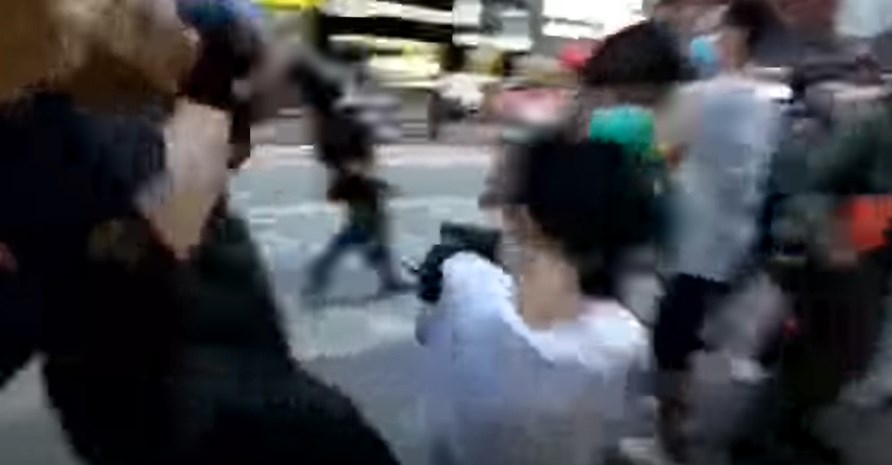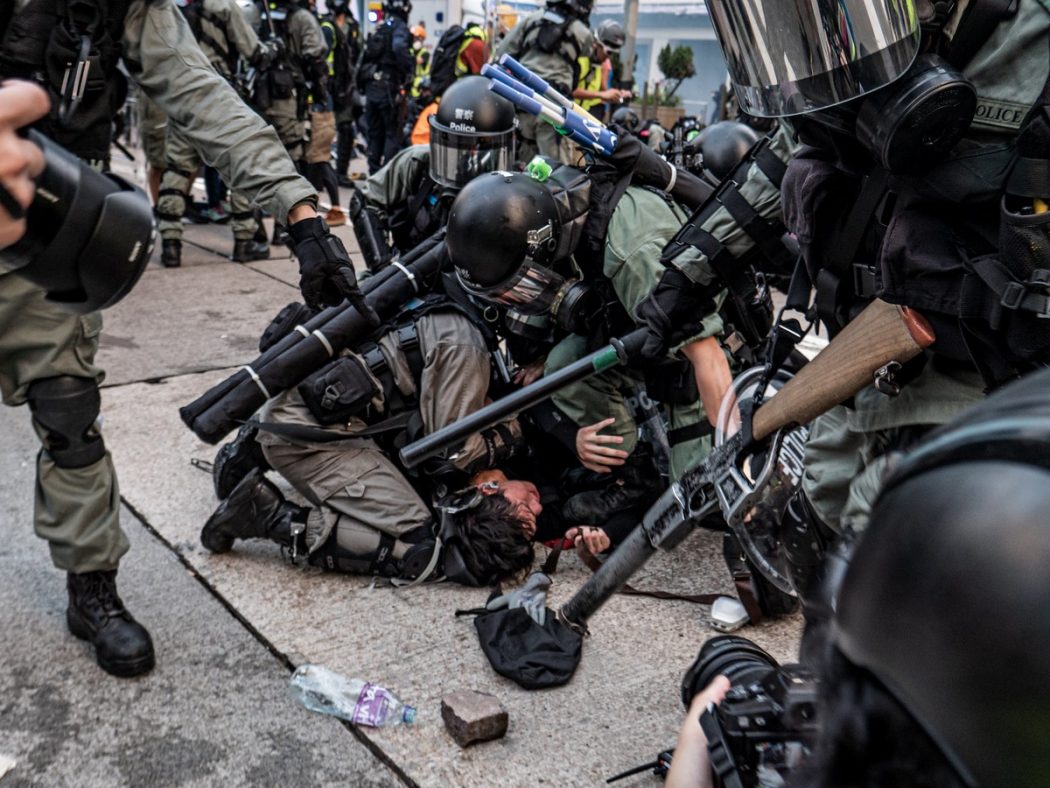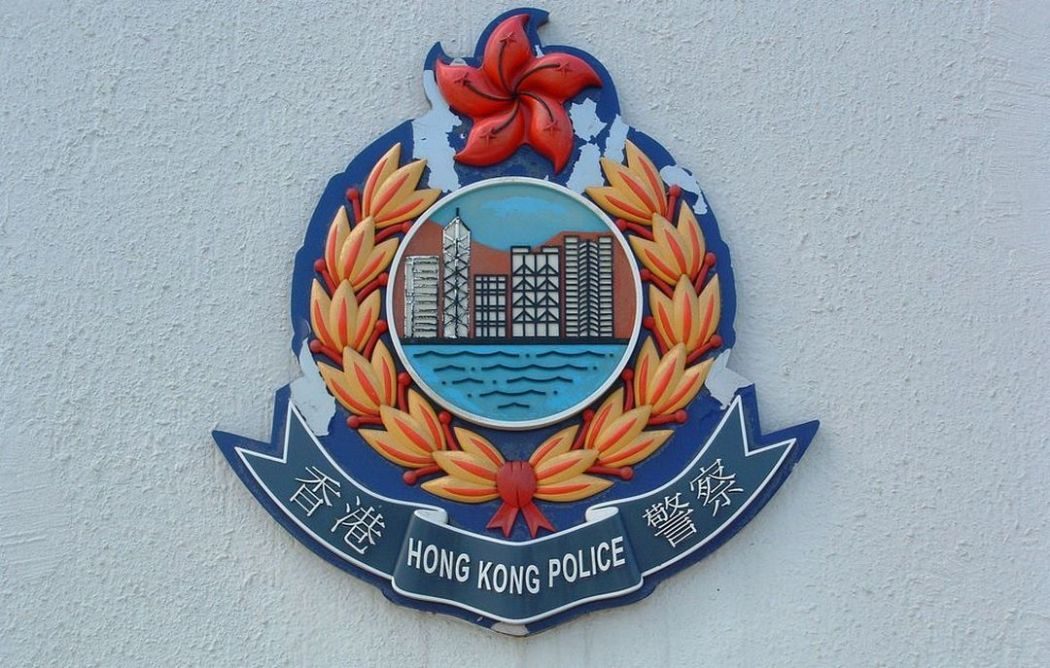It is nice to see Hong Kong become a global talking point. But perhaps this could be done in a more flattering way than Sunday’s eye-catching video — broadcast on all international TV stations — of the Hong Kong Police laying down the law on a 12-year-old girl.
One tries not to jump to conclusions from video clips, but this leaves little room for interpretation. If a duck looks like a duck and quacks like a duck, it’s a duck. Here we see several adults bullying a child. If a parent did this to his daughter, he would be prosecuted.

Some of the sting might have been drawn from this catastrophe by a tactful apology along the following lines: “Confused situation … people get excited … not necessary to use the full anti-cockroach technique on a minor … sorry.”
Instead we got the usual, untouched by human brain “our boys can do no wrong” response from the usual spokesman. The victim had run “in a suspicious manner” and had been subjected only to “minimum necessary force”. Self-righteous hogwash.
I fear my education missed out on running in a suspicious manner. In primary school, we were encouraged to stand like a tree, waving in the wind, or run like a horse, galloping across the prairie, but somehow “running suspiciously” never came up. Looking at the video, though, the runner does not look suspicious. She looks terrified.
As for the minimum use of force, surely the minimum force required to subdue someone so small would involve one person and one person only. Some compromise on the “flat on the pavement” front would also have been appropriate.
Then, we got the prosecution. It is sadly a recurring feature of police excess that the victim must be charged with something, in order to discredit the expected complaint. So our 12-year-old victim, who is apparently called Pamela, was treated to an on-the-spot fine for a social distancing violation.
Just a cotton-picking minute. Leaving aside the question whether Pamela, who lives in the area and was just shopping with an older brother, actually violated the rules, there is a little legal hitch involved here.
I quote from the Law Reform Commission report on the age of criminal liability: “The law … presumes that a child between the ages of seven and 14 is incapable of committing a crime, unless the prosecution proves beyond reasonable doubt that, at the time of the offence, the child was well aware that his or her act was seriously wrong, and not merely naughty or mischievous.”

So there is a legal presumption that Pamela cannot break the law. This can only be overthrown by proof of knowledge and motives. So the issuing of the on-the-spot fine was unjustified and unlawful.
This little detail had passed unnoticed by the Hong Kong government, which cheerfully announced on Sunday night that “Police discharged their rightful duties today and took prompt and decisive actions to apprehend the offenders.”
We were also treated to this: “In a later statement police said: ‘Police attach great importance to integrity. If any person considers he or she is affected by police misconduct, he or she may lodge a complaint to the Complaints Against Police Office. It will be handled in a fair and impartial manner according to established procedures.’” It would be subversive to giggle at this point.

Oh, how fair and impartial the established procedures can be! Oddly enough, this phrase cropped up later in the week when the Complaints Against Police Office starred in a rare court case. The complainant (arrested in a theft case: nothing political) pleaded guilty to making a false complaint and was jailed for four months.
Apart from the usual bit about CAPO handling cases in a “fair and impartial manner” the triumphant CAPO spokesman, Chief Inspector Chau Kwok-kuen, also said that the prosecution had been approved by the Secretary for Justice.
Quite why the Secretary had been involved in such a trivial matter, we were not told. Can it be that someone thought that prosecuting a complainant, after so many complaints had fallen on stony ground, might be considered ironic, even satirical?
But satire wilts before the reality of justice Hong Kong-style these days. On Monday, according to Wednesday’s Standard, the Department of Justice asked a court to order one Billy Chiu Hin-chung to pay a total of HK$171,000 to four police officers who were allegedly injured by him during a protest.

The protest took place on October 17, 2014. How can any court be expected to determine liability for events so long ago? Does Mr Chiu have HK$170,000? Did the relevant file get lost for six years?
One wonders if Mr Chiu, a former member of a subversive minigroup called Hongkong Priority, is just the latest victim of a drive to dump on dissidents of any kind with whatever legal implement comes to hand.
This brings us to Mr Tam Tak-chi, also known as “Fast Beat,” who appeared in court on Tuesday charged with uttering seditious words under the old Crimes Ordinance definition. In other words, after years of complaining that Hong Kong had no sedition law the forces of order have now discovered that it was there all the time.
The prosecution line is that Mr Tam, a leading figure in People Power — an organisation we can assume the Liaison Office is not fond of — incited hatred of the government by uttering the slogan “Liberate Hong Kong, revolution of our times”.

This is a stunning revelation. Numerous people have been shouting this slogan for more than a year without being prosecuted. Now we are expected to believe that it was illegal all this time? Was the Secretary for Justice asleep then? Or is justice asleep now?
The degradation of the rule of law goes on. Also on Sunday, a bus driver was arrested for dangerous driving. After reviewing his dash cam, the man’s employers seem fairly confident that that charge is not going to stick.
The assembled Sherlocks also charged him with having an offensive weapon, because they found a spanner in his bag. Bus drivers often carry a spanner. It is used to adjust the rear-view mirrors. But this gentleman has no need to explain his possession of a spanner.
The law is quite clear. A blunderbuss or a bazooka are offensive weapons in themselves. When it comes to ordinary civilian objects, they will only be offensive if the context suggests that they were going to be used offensively. If you are driving a bus, there is no such context. This charge was a simple abuse of process.
The bus driver spent 24 hours in custody. It seems his real offence was to suppose that policemen scattered over the road would welcome warning of his approach. Our police force is a sensitive one. Hoot at your peril.
Support HKFP | Policies & Ethics | Error/typo? | Contact Us | Newsletter | Transparency & Annual Report | Apps
Help safeguard press freedom & keep HKFP free for all readers by supporting our team
| HKFP is an impartial platform & does not necessarily share the views of opinion writers or advertisers. HKFP presents a diversity of views & regularly invites figures across the political spectrum to write for us. Press freedom is guaranteed under the Basic Law, security law, Bill of Rights and Chinese constitution. Opinion pieces aim to point out errors or defects in the government, law or policies, or aim to suggest ideas or alterations via legal means without an intention of hatred, discontent or hostility against the authorities or other communities. |

More HKFP OPINION:
HKFP has an impartial stance, transparent funding, and balanced coverage guided by an Ethics Code and Corrections Policy.
Support press freedom & help us surpass 1,000 monthly Patrons: 100% independent, governed by an ethics code & not-for-profit.











